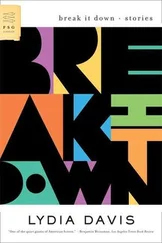Lydia Davis - Almost No Memory
Здесь есть возможность читать онлайн «Lydia Davis - Almost No Memory» весь текст электронной книги совершенно бесплатно (целиком полную версию без сокращений). В некоторых случаях можно слушать аудио, скачать через торрент в формате fb2 и присутствует краткое содержание. Год выпуска: 2001, Издательство: Farrar, Straus and Giroux, Жанр: Современная проза, на английском языке. Описание произведения, (предисловие) а так же отзывы посетителей доступны на портале библиотеки ЛибКат.
- Название:Almost No Memory
- Автор:
- Издательство:Farrar, Straus and Giroux
- Жанр:
- Год:2001
- ISBN:нет данных
- Рейтинг книги:3 / 5. Голосов: 1
-
Избранное:Добавить в избранное
- Отзывы:
-
Ваша оценка:
- 60
- 1
- 2
- 3
- 4
- 5
Almost No Memory: краткое содержание, описание и аннотация
Предлагаем к чтению аннотацию, описание, краткое содержание или предисловие (зависит от того, что написал сам автор книги «Almost No Memory»). Если вы не нашли необходимую информацию о книге — напишите в комментариях, мы постараемся отыскать её.
. In each of these stories, Davis reveals an empathic, sometimes shattering understanding of human relationships.
Almost No Memory — читать онлайн бесплатно полную книгу (весь текст) целиком
Ниже представлен текст книги, разбитый по страницам. Система сохранения места последней прочитанной страницы, позволяет с удобством читать онлайн бесплатно книгу «Almost No Memory», без необходимости каждый раз заново искать на чём Вы остановились. Поставьте закладку, и сможете в любой момент перейти на страницу, на которой закончили чтение.
Интервал:
Закладка:
This man, his illness, his fear for his life, and the blasphemy that had caused his illness, as he probably thought, and also something else he said about God that she remembered later, riding a train out of the city, could be at the center of the story, with the Bible and the hurricane at the edge of it, but there may not be enough to tell about him for him to be the center, or this may be the wrong time to tell it.
So there is the hurricane that did not strike the city but cast a yellow light over it, and there is this man, and there is the Bible, but no landlady, no President, and no newscasters, though she watched the news several times a day, every day, to see what the hurricane was going to do. The newscasters would tell her to look out the window and she would look. They would tell her that at that very moment, because the sun had just set, rams’ horns were being blown all over the city, and she would be excited, even though she could not hear any rams’ horns in her neighborhood. But though the newscasters serve to hold the story together from one day to the next, they are not in themselves very interesting and certainly not central to a story that has trouble finding its center.
In those days she also visited churches and synagogues. The last church she visited was a Baptist congregation in the north of the city. There, large black women in white uniforms asked her to sit down but she was too nervous to sit. Then, standing at the back of the crowded hall, she began to feel faint when a procession of women in red robes came toward her at a stately pace, singing. She left, found the ladies’ room, and sat in a stall watching a fly, not sure she would be able to stand up again.
In fact, close to the center of the story may be the moment when she realizes that, even though she is not a believer, she has an unusual, religious sort of peace in her, perhaps because she has been visiting churches and synagogues and studying the Bible, and that this peace has allowed her to accept the possibility of the worst sort of disaster, one even worse than a hurricane.
She rides the train up along the river away from the city. The danger of the hurricane is past. The water in the river has not risen to cover the tracks, though it is close to them. As she looks out at the water, she suddenly remembers the devil. She has not made a place for him in what she might believe, or even in the questions she is asking about what she believes. She has asked several friends whether they thought there was a God, but she has not mentioned the devil to anyone. After she remembers this, she realizes something else: the very fact that she has forgotten the devil must mean he has, at this point, no place in her beliefs, though she thinks she believes in the power of evil.
This comes close to the end of the story as it is now, but she can’t really end with the devil and a train ride. So the end is a problem, too, though less of a problem than the center. There may be no center. There may be no center because she is afraid to put any one of these elements in the center — the man, the religion, or the hurricane. Or — which is or is not the same thing — there is a center but the center is empty, either because she has not yet found what belongs there or because it is meant to be empty: there, but empty, in the same way that the man was sick but not dying, the hurricane approached but did not strike, and she had a religious calm but no faith.
LOVE
A woman fell in love with a man who had been dead a number of years. It was not enough for her to brush his coats, wipe his inkwell, finger his ivory comb: she had to build her house over his grave and sit with him night after night in the damp cellar.
OUR KINDNESS
We have ideals of being very kind to everyone in the world. But then we are very unkind to our own husband, the person who is closest at hand to us. But then we think he is preventing us from being kind to everyone else in the world. Because he does not want us to know those other people, we think! He would prefer us to stay here in our own house. He says the car is old. We know that really he would prefer us to be acquainted with only a small number of people in the world, as he is. But what he says is that the car would not take us very far. We know he would prefer us to look after our own house and our own family. Our house is not clean, not completely clean. Our family is not completely clean. We think the car would serve us well enough. But he thinks we may want to go out and be kind to other people only because we would prefer not to be at home, because we would prefer not to have to try to be kind only to these three people, of all the people in the world the hardest three for us, though we can easily be kind to so many other people, such as those we meet at the stores, where we go because there our car, he says, may safely take us.
A NATURAL DISASTER
In our home here by the rising sea we will not last much longer. The cold and the damp will certainly get us in the end, because it is no longer possible to leave: the cold has cracked open the only road away from here, the sea has risen and filled the cracks down by the marsh where it is low, has sunk and left salt crystals lining the cracks, has risen again higher and made the road impassable.
The sea washes up through the pipes into our basins, and our drinking water is brackish. Mollusks have appeared in our front yard and our garden and we can’t walk without crushing their shells at every step. At every high tide the sea covers our land, leaving pools, when it ebbs, among our rosebushes and in the furrows of our rye field. Our seeds have been washed away; the crows have eaten what few were left.
Now we have moved into the upper rooms of the house and stand at the window watching the fish flash through the branches of our peach tree. An eel looks out from below our wheelbarrow.
What we wash and hang out the upstairs window to dry freezes: our shirts and pants make strange writhing shapes on the line. What we wear is always damp now, and the salt rubs against our skin until we are red and sore. Much of the day, now, we stay in bed under heavy, sour blankets; the wooden walls are wet through; the sea enters the cracks at the windowsills and trickles down to the floor. Three of us have died of pneumonia and bronchitis at different hours of the morning before daybreak. There are three left, and we are all weak, can’t sleep but lightly, can’t think but with confusion, don’t speak, and hardly see light and dark anymore, only dimness and shadow.
ODD BEHAVIOR
You see how circumstances are to blame. I am not really an odd person if I put more and more small pieces of shredded Kleenex in my ears and tie a scarf around my head: when I lived alone I had all the silence I needed.
ST. MARTIN
We were caretakers for most of that year, from early fall until summer. There was a house and grounds to look after, two dogs, and two cats. We fed the cats, one white and one calico, who lived outside and ate their meals on the kitchen windowsill, sparring in the sunlight as they waited for their food, but we did not keep the house very clean, or the weeds cut in the yard, and our employers, kind people though they were, probably never quite forgave us for what happened to one of the dogs.
We hardly knew what a clean house should look like. We would begin to think we were quite tidy, and then we would see the dust and clutter of the rooms, and the two hearths covered with ash. Sometimes we argued about it, sometimes we cleaned it. The oil stove became badly blocked and we did nothing for days because the telephone was out of order. When we needed help, we went to see the former caretakers, an old couple who lived with their cages of breeding canaries in the nearest village. The old man came by sometimes, and when he saw how the grass had grown so tall around the house, he scythed it without comment.
Читать дальшеИнтервал:
Закладка:
Похожие книги на «Almost No Memory»
Представляем Вашему вниманию похожие книги на «Almost No Memory» списком для выбора. Мы отобрали схожую по названию и смыслу литературу в надежде предоставить читателям больше вариантов отыскать новые, интересные, ещё непрочитанные произведения.
Обсуждение, отзывы о книге «Almost No Memory» и просто собственные мнения читателей. Оставьте ваши комментарии, напишите, что Вы думаете о произведении, его смысле или главных героях. Укажите что конкретно понравилось, а что нет, и почему Вы так считаете.












